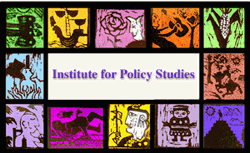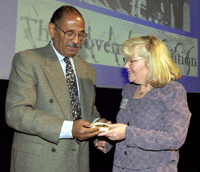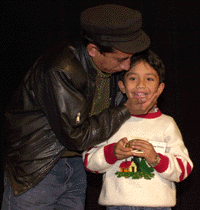NEWS ARCHIVE:
COCKBURN PERFORMS AT THE LETELIER-MOFFITT
HUMAN RIGHTS AWARDS CEREMONY IN D.C.
"TO ME AN ACTIVIST PUTS THEIR LIFE ON THE LINE OR AT LEAST
THEIR LIVELIHOOD ON THE LINE FOR WHAT THEY BELIEVE IN."
News Index

24 October 2000 -- Bruce Cockburn gave an intense and thoughtful virtuoso performance at the Institute for Policy Studies' 24th Annual Letelier-Moffitt Human Rights Awards ceremony in Washington, D.C. on October 16, 2000. Ruth White reports for the Project on the event and Bruce's performance.
It was about a 50-minute set of just Bruce and one guitar - no band and no breaks and unfortunately, no encores.
I was lucky to meet five other Bruce Cockburn fans, one newly back in the States after two years in South Africa. We sat in the middle very close to the stage and were very enthusiastic. The audience seemed full of liberal intellectuals and policy wonks - they responded applauded well but were subdued while listening and responded more to some songs than others - I sensed many were hearing him for the first time.
"I'm honored to be asked to share the stage to help celebrate here," explained Cockburn, after being introduced, "In the media when I am interviewed they say I am an activist because I sing certain songs - that is if they are polite they call me an activist - sometimes they just call me an a**hole. To me an activist puts their life on the line or at least their livelihood on the line for what they believe in. I'm not an activist, I'm a songwriter. I get to sing songs about people and issues and human experience. That's where my songs are coming from..."
[Song: Rumours Of Glory]
I can't believe I am so near the stage - and Bruce sounds so very very good! In Rumors of Glory when he said, "scorched," he said the word with such force -- chills went down my back -- "...beneath it's shining like gold, but better" -- who else can write lyrics like this? And he sounds better in person than on the CD, or maybe it is the emotion of this evening and his intense delivery. Bruce introduced the next song:
"NAFTA was mentioned before - and free trade agreements. Free for who or for what? When Ontario got free trade agreements a whole bunch of one industry towns died suddenly. Just went over. There was cheaper labor elsewhere. I shouldn't talk, just play songs. Others here talked tonight. But I will talk...
I toured in Japan once, and on the plane I happened to get into first class and sat next to the Japanese representative to the World Bank. I didn't at that time know what he did, so he told me what it meant to be the representative. He was proud of his position. He told me you can move commodities, that is called trade, but in the future you will be
able to move money and people without considering borders. Move them to where they are needed. I was disgusted. People being treated as commodities. I wrote a song based on that conversation I haven't sung it in a while. Thinking about the movement of trade of trade, jobs and people..."
[Song: Mighty Trucks of Midnight]
Cockburn followed this song with just a short introduction to the next one.
"This song was inspired by the goings on in Canadian politics, but you
may find something in it as the elections are going on here for you..."
[Song: Let The Bad Air Out]
At this point the Bruce fan next to me said, see how good he sounds - you don't even miss the band. She is much younger than I am and a musician. Most of the time in the two concerts I saw this year I felt the band was more of an impediment to my enjoyment which I had to transcend.
"This one is conspicuously light on lyrics," said Bruce, "It's from Breakfast In New Orleans, Dinner In Timbuktu..."
[Song: Down To The Delta]
He was really showing his technical skill with this song and I felt if the audience didn't know he was a great musician before, they do now. They reacted warmly. Personally although I see the skill in this I much prefer songs with words. After the applause Bruce said "After touring for a little over a year with a band, I'm feeling the absence of
the band. Hopefully, you're not feeling it." I guy in the audience (and not one in our fan group) said loudly, impulsively "You sound great Bruce". He went on to introduce several songs from conflict areas.
"Now I'll sing a few songs from war zones. I have over the years had
occasion to travel to a few war zones. This is from my first experience. I went to Central America in the early 80's. I saw things there you only see on TV. It made quite an impression as you can imagine. This is sort of a landscape from Nicaragua..."
[Song: Dust And Diesel]
"In 1988, I went to Mozambique for the first time in behalf of Canadian NGO's who pooled their resources to provide for the displaced from the North - displaced from years of civil war. My job was to observe and then speak about it at home. I came back and made speeches and did a magazine article.
No songs came out of that because my energy went to the speeches. Then years later I went back, and now the war was over but the people couldn't get back on the land because of the danger of land mines. I went there and met people who had suffered."
[Song: The Mines of Mozambique]
"In the course of several trips to Central America in the 80's I met people who were trampled by US economic policies. In Nicaragua but also peasant in other countries who suffered under the status quo. I got a song from it. It got more radio play in Canada, less in the US. It was deemed un-American.
In Chicago a guy wanted to put in pay toilets. The public protested, rightly so, and they were not installed. The guy said it was un-American not to let him charge people to take a....!
So in this context, getting called un-American is a cool thing. This song is called un-American even though it doesn't mention the US.
I have (still have) a great video of it. MTV would play it. They played it for maybe three seconds, but then they wouldn't play it because it mentioned the names of some products. It had an image of peasants being ground up and coming out in Coke bottles."
[Song: Call It Democracy]
Of course this crowd loved this song. Lots of applause.
"This song was written in Managua after a few visits to that part of the world and I had a chance to see how things kind of added up and it occurred to me.. I was honored to be singled out by Vernon Walters as one of the artists duped by the Sandinistas. I was just one of the artists talking about people and people lives. They were not perfect, they had some reliance on Marxist rhetoric about history , but that was just rhetoric.
But history will never be the same because of what they did. Maybe history doesn't belong to them. But they tried bravely to establish a fair social order. This is a song for people trying against odds most of the time to set things right in the world. I send this out to the honorees tonight..."
[Song: Waiting For A Miracle]
The audience reacted as Bruce left the stage with lots of applause and a standing ovation. But there was more program to come, so there was no encore.
The emcee John Cavanagh said, "Thank you Bruce for a wonderful performance of international solidarity"
Some in the crowd were going to the optional $150 fundraising dinner following the
ceremony which was supposed to be over at 9 p.m. but lasted till closer to 9:30 p.m.. There were women wearing off the shoulder long black slinky dresses (I assume those really dressed up were going to the expensive dinner). And many wearing what they wore to work - mostly on the dressy side - young people and older people. Lots of professionals like socially-conscious activists, academics, artists, intellectuals,
politicians and lawyers.
I met fans before the concert and we traded the title of favorite songs. I told one guy that there was some discussion on the Humans list of the pros and cons of the Dart to the Heart album and he said yeah some of those songs he didn't like as much but some of his favorite songs were on the album and he spent some time trying to remember the song titles. He (and the woman I sat next to inside) both waxed lyrical about The Rose Above The Sky - which I listened to on the way home and it's still not in my top Bruce songs. But we agreed on some we liked best. And meeting other fans live in person was great.
The program (apart from Bruce) was quite impressive. I am a liberal, and almost everything I heard tugged on my heart-strings. I was so glad I was there. The speakers were so passionate and articulate.
About the Letelier-Moffit Awards
Orlando Letelier and Ronni Karpen Moffitt were killed by a car-bomb here
in Washington, DC in 1976. It is the only proven act of "state-sponsored" terrorism to occur here on U.S. soil. The Letelier-Moffitt award ceremony in their honor is held every year since. There was lots of rejoicing that Pincochet, former Chilean dictator was arrested in London and detained for 16 months for "crimes against humanity". He is now living in Chile, and there is now a chance that he may be brought to trial in Chile.
An IPS awards program insert stated, "In the US, intense public pressure has resulted in the release of thousands of declassified documents, legislation that forced the the CIA to release more information on its role in the Pincochet regime, and -- at long last -- signs of progress in a Justice Department investigation of Pinochet's role in the Letelier-Moffitt murders."
The Award Ceremony
Congresswoman Maxine Waters introduced Congressman John Conyers (who because of his seniority on the Justice Committee will chair the investigation committee if the Democrats win Congressional control.)
Conyers presented the first award. In his speech Conyers said, "We will be locked into stances of support or opposition for probably the rest of our lives (at least the rest of his work life) depending on the decision (in the US presidential election) in the next 22 days."
Conyers spoke of the failed drug policy which fuels a high rate of incarcerating non-violent offenders with no previous record. It is not a war on drugs it is a war on people. Of the so called 13 million drug users nationwide, 10 million are marijuana users. We are jailing the most vulnerable in our society -- the young and low income -- and we now have a prison-industrial complex. 25 percent of the 2 million in prison are non-violent drug offenders.

He presented an award to a Nora Callahan (left) who with her imprisoned brother, founded the November Coalition to raise public awareness about the injustices of the failed Drug policies, and the draconian mandatory sentences, racial bias in sentencing etc. We need treatment not oppressive jail warehouses, many run by private contract businesses. See their web site at http://www.november.org/
After this award was when Bruce was introduced and played. The emcee, IPS Director, John Cavanagh, said that the Canadians are daylights ahead of the US in a wide range of issues, including globalization, environment, prison, health care, education and more. He said, Bruce is another example of Canadians being out in front.
After Bruce's performance the 2nd award was given out and then the program was over. The second award was presented by Linda Chavez-Thompson, the highest ranking female American AFL-CIO union officer who gave the award to Oscar Olivera, a union leader in Bolivia who battled a plan out by a subsidiary of US based Bechtel to privatize a city's water.
Under the plan this plan, workers who earn $100 per month would have to pay $25 a month for water. There were protest marches and Oscar had to go into hiding. At one point 5 people were killed and 100's wounded, and later another 10 were killed. But they and got reform laws passed which preserved the right of the people to inexpensive water. They also built community and empowered the people to both stand up for themselves and ultimately find peaceful solutions.

World Bank involvement - Note that although the World Bank did not specifically dictate this plan, the World Bank has whole-heartedly and aggressively pushed privatization of public water in Bolivia.
After accepting the award, Oscar Olivera handed it to his 5 or 6-year-old son Diego (right), in the hope that his son and the next generation will continue the struggle for economic and social justice.
I left moved and energized. I wish I had doses of the inspiration I felt here more often. I looked for Bruce but did not see him and I had an hour's drive home and work the next day, so I reluctantly left. But I left with hope that the lawyer I met, who is a Bruce Cockburn fan, will be able to get her agency (a similar kind of organization that has similar yearly benefit) to host Bruce Cockburn next year....
Ruth White, Columbia, MD.
Related links:
News Index
This page is part of The Cockburn Project, a unique website that exists to document the work of Canadian singer-songwriter and musician Bruce Cockburn. The Project archives self-commentary by Cockburn on his songs and music, and supplements this core part of the website with news, tour dates, and other current information.


